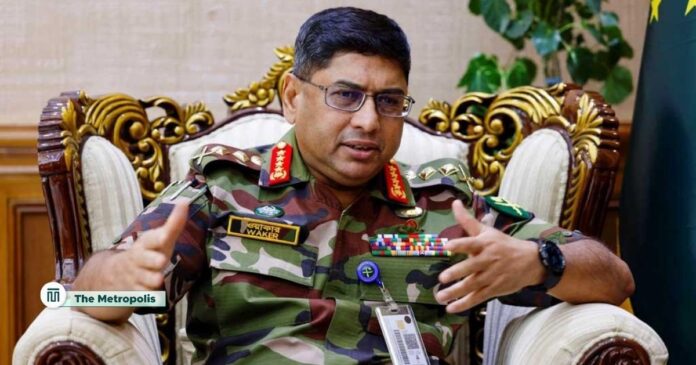Following Prime Minister Sheikh Hasina’s ouster, the army chief of Bangladesh pledged to support the country’s interim government “come what may” in order to help it finish important reforms and hold elections within the next 18 months.
Early in August, amid intense student-led protests against Hasina, General Waker-uz-Zaman and his troops withdrew, effectively ending the career of the veteran politician who had resigned after 15 years in office and fled to neighboring India.
In an uncommon media appearance, Zaman said to Reuters on Monday at his Dhaka office that he fully supported the Muhammad Yunus-led interim government and that it had a plan in place to remove the military’s political sway.
“I’ll be by his side. Whatever happens. In order for him to complete his task,” bespectacled and wearing military fatigues, Zaman spoke of Yunus.
The father of the international microcredit movement, Yunus has committed to implementing critical changes to the legal system, law enforcement, and financial institutions, clearing the path for the 170 million-person nation to have free and fair elections in the future.
After the changes, Zaman—who became army chief just a few weeks before Hasina was overthrown—stated that the shift to democracy should take between a year and a year and a half, but he emphasized the need for patience.
“If you ask me, then I will say that should be the time frame by which we should enter into a democratic process,” he stated.
Elections were to be held within three months of the interim government’s establishment in August, according to previous calls made by Hasina’s Awami League and her fierce rival, the Bangladesh Nationalist Party.
According to Zaman, the military supports the government’s efforts to stabilize the nation following a period of unrest. Yunus, the chief adviser to the interim administration, and the army chief have “very good relations” and meet every week.
“I’m sure that if we work together, there is no reason why we should fail,” he stated.
The bloodiest period in the nation’s independent history, the violent clashes that started in July as a movement against public sector job quotas turned into a wider anti-government uprising that claimed over 1,000 lives.
The crowded metropolis of Dhaka, which was the epicentre of the uprising, is once again peaceful, but after Hasina’s administration fell dramatically, some parts of the civil service are still not operating at full capacity.
The army has stepped up to handle law and order duties across the country since the majority of Bangladesh’s police force, which is estimated to be around 190,000 strong, are still in disarray.
Penalties and changes
Born out of what was once East Pakistan in 1971 following a bloody war for independence, Bangladesh came under military rule in 1975 after Hasina’s father, Sheikh Mujibur Rahman, was assassinated as the country’s first prime minister.
A public uprising in 1990 overthrew the military government of Hossain Mohammad Ershad and restored democracy to the nation.
Once more, the military put up a coup in 2007 to support a provisional administration that lasted until Hasina assumed office two years later.
Zaman, a career infantry officer who served during these turbulent times, stated that the Bangladesh Army, which he commands, would not get involved in politics.
“I am a professional soldier, and I will not do anything that is detrimental to my organization,” he declared. My goal is to maintain my army’s professionalism.”
In keeping with broad government reforms suggested since Hasina was removed from office, the army is also investigating claims of misconduct by its members and has already disciplined some of them, according to Zaman, without giving any more information.
The former prime minister or interior minister may have had direct control over some military officials who acted inappropriately while they worked there. “If any serving member is found guilty, of course I will take action,” he said.
A five-member commission led by a former high court judge has been appointed by the interim government to look into allegations that up to 600 people may have been “disappeared” by Bangladeshi security forces under duress since 2009.
Longer term, though, Zaman sought to separate the army—which numbers over 130,000 soldiers and plays a significant role in UN peacekeeping operations—from the political establishment.
“It can only happen if there is some balance of power between the president and prime minister, where the armed forces can be placed directly under the president,” he stated.
The defence ministry, which is normally headed by the prime minister, is currently in charge of Bangladesh’s armed forces. Zaman stated that a constitutional reform process led by the interim government may look to change this arrangement.
“The military as a whole must not be used for political purposes ever,” he stated. “A soldier must not indulge in politics.”
Create an account
Welcome! Register for an account
A password will be e-mailed to you.
Password recovery
Recover your password
A password will be e-mailed to you.



